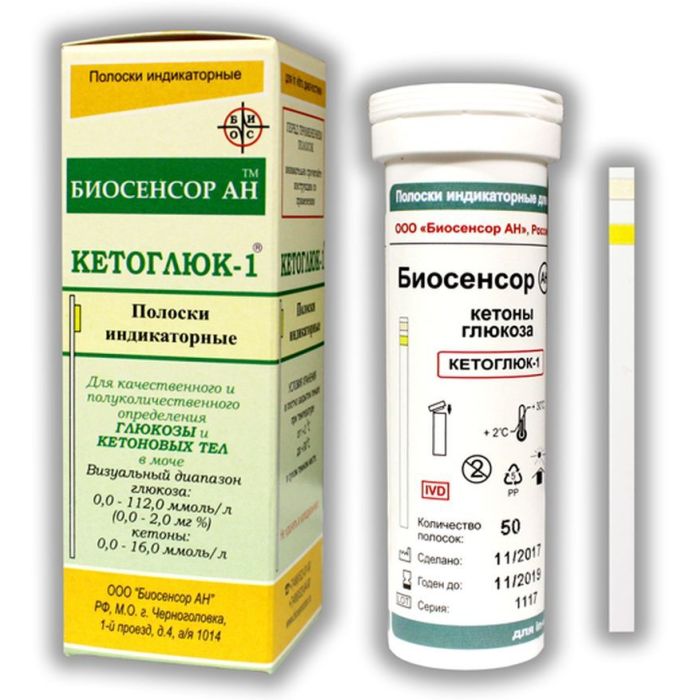Visual test strips 'Ketogluk -1 '# 50
Test purpose
Measuring glucose
Amount in a package
fifty
Manufacturer country
Russia
Brand name
Biosensor AN OOO
A type
Test strips
PURPOSE
Indicator strips for the qualitative and semi-quantitative determination of glucose and ketone bodies in urine KETOGLUK-1 are intended for the qualitative and semi-quantitative determination of glucose and ketone bodies in urine in medical institutions, as well as at home (for rapid in vitro diagnostic analysis).
Applications - self-testing, clinical laboratory diagnostics, clinical medicine, emergency express diagnostics.
Qualitative and semi-quantitative determination of glucose in urine is used as an auxiliary method to control the course of diabetes mellitus, diagnose, monitor and evaluate the effectiveness of treatment of diabetes, kidney and endocrine system functions, as well as to monitor the condition of a pregnant woman, etc.
Qualitative and semi-quantitative determination of ketone bodies in urine (ketonuria) is used as an auxiliary method, to control the course of diabetes mellitus, carbohydrate starvation, feverish conditions, general starvation and exhaustion, intake of foods rich in ketogenic substances, when taking significant amounts of alkaline substances, in conditions after operations, glycogenosis I, II and VI type, hyperinsulinism, thyrotoxicosis, severe glucosuria, acromegaly, hyperproduction of glucocorticoids, infectious diseases (scarlet fever, influenza, tuberculous meningitis, etc.), severe intoxication (for example, with other lead poisoning) and
1.1. Glucose belongs to the class of carbohydrates (sugars) and serves as a universal source of energy in the body. The main role of glucose in the body is energy, participation in biochemical reactions that provide the cells of the body with energy, it also performs a structural function, being part of various molecules. There are two main factors causing the appearance of glucose in the urine: an increase in blood glucose above the renal threshold (hyperglycemia) and impaired reabsorption of glucose in the kidneys due to their damage. With kidney diseases that disrupt the nephron, incomplete reabsorption of glucose occurs and it appears in the urine. An increase in blood glucose leads to an increase in it in the primary urine, when a certain threshold is exceeded, even healthy kidneys do not completely reabsorb glucose, so that it enters the urine.Blood glucose can increase in healthy people with excessive consumption of carbohydrates in food, stress, and occasional use of certain medications. In general, the level of blood glucose depends on hormonal regulation, and its fluctuations indicate the pathology of the endocrine system.
Ketone bodies belong to the group of organic compounds (β-hydroxybutyric acid, acetoacetic acid, and acetone), which are intermediate products of the metabolism of fats, carbohydrates, and proteins.
The appearance of an increased amount of ketone bodies in the urine indicates a violation of carbohydrate and fat metabolism.
Test strips are intended for in vitro diagnostics.
Test strips are for single use only.
Potential risk class - 2a.
DEFINITION
1. Control at a temperature (+ 15– + 30 ° С).
2. Open the case or open the bag, remove the indicator strip from it.
If the indicator strips are packed in a pencil case, immediately close the latter tightly with a lid.
3. Immerse the sensor strip completely in the urine.
After 2-3 seconds, remove the indicator strip and remove excess urine on the sensor elements by gently touching the rib of the strip to clean filter paper (clean paper towel, paper towel, toilet paper, etc.) for 2-3 seconds.
4. Place the test strip on a flat dry surface with the sensor elements facing up.
5. After 1 minute from the moment the sensory elements are immersed in urine, compare the color of the corresponding sensory element with the color scale on the package label under good lighting conditions.
!
Registration of the obtained analysis results can be carried out visually.
!
Do not compare the color of the sensor element with the color scale in direct sunlight.
!
During the test, do not touch the sensor element of the Test Strip with your hands.
A semi-quantitative determination is carried out by comparing the color of the sensor element with the corresponding color fields of the scale.
Changes in color, which can only occur at the edges of the sensory area (edging), are not diagnostic.
!
Strict adherence to the instructions for use is essential to obtain reliable results!
CONDITIONS OF STORAGE, OPERATION AND DISPOSAL OF THE PRODUCT
Test strips should be stored in the manufacturer's packaging in a dry place at temperatures up to 30 ° C (in the absence of acid, alkali and organic solvent vapors) for the entire shelf life of 24 months.
Biochemical research of water should be carried out at a temperature of + 10- + 35 ° C.
Improper storage and use will result in the loss of functionality of the test strips.
Keep out of the reach of children.
It is necessary to protect the indicator strips from high humidity and direct sunlight.
Avoid direct sunlight on the color scale.
Each indicator strip is designed for one determination.
After opening the case, the indicator strips should be used within no more than 5 months.
The test strip taken out of the package should be used for analysis within 15 minutes.
Do not use after the expiration date.
In case of testing after use, all components and packaging should be thrown into the waste container.
Specifications
Test purpose
Measuring glucose
Amount in a package
fifty
Manufacturer country
Russia
Brand name
Biosensor AN OOO
A type
Test strips
Package weight, g
28

